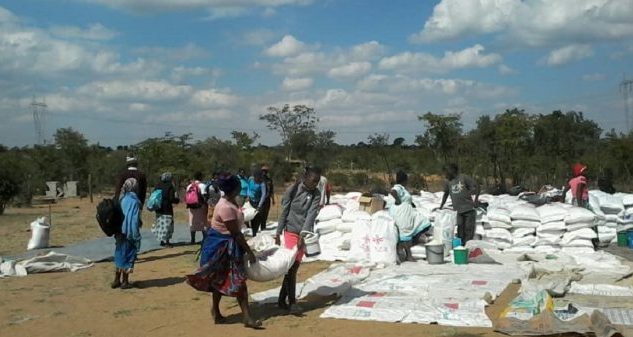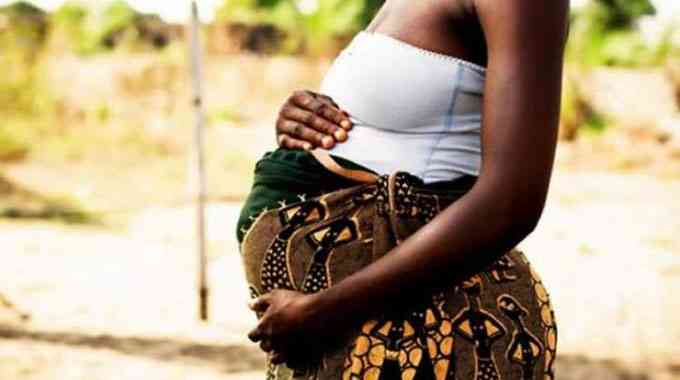
BY EVANS MATHANDA CLUTCHING a dirty old gray rolled sack, 75-year-old Sharon Tshuma shuffles along the Mxotshwa-Shagari gravel road enduring the scorching heat of the mid-day sun.
Although 12km is too long a distance for her to walk, she has to get to Shagari to collect her share of food aid donated by government in partnership with non-government organisations.
She cannot fathom the thought of watching her grandchildren starving if she fails to collect the bag of maize.
What hurts her most is that she sees the truck ferrying the precious starch driving past her homestead, headed for its destination, a long distance away from her home. Tshuma has no choice but to walk that distance to collect her share — a 70kg bag of maize .
Her predicament is similar to that of hundreds of other elderly villagers in the Lower Gweru community, who despite being broke find themselves in situations where they pay transport costs to access donated food aid.
This has prompted them to appeal to government to decentralise food distribution centres so that they travel shorter distances to reduce transport costs.
“We have been walking for about 12km to Shagari, our constituency centre, for decades whenever there is food distribution” Tshuma says, while shaking her head in dismay.
“I think since we started getting food from NGOs [non-governmental organisations] some years ago, people from Mxotshwa village and St Faith have been walking to Shagari where we receive our bags of food according to one’s family size. Any form of help we get from government and NGOs is usually distributed in Shagari or St Faith, but they are too far. Apart from that, we pay people who take our bags home,” she adds.
- Chamisa under fire over US$120K donation
- Mavhunga puts DeMbare into Chibuku quarterfinals
- Pension funds bet on Cabora Bassa oilfields
- Councils defy govt fire tender directive
Keep Reading
Since 2006, when humanitarian organisations started to give food aid in Lower Gweru, the villagers in Mxotshwa under Chief Mdubiwa, who benefit from the programme, have been walking at least 12km to and from Shagari to get their rations and other donations.
Due to patriarchal ideologies in Africa, women are carrying the burden of ensuring household food security. Therefore, women are at the forefront of receiving aid, hence going through the painful experiences.
The majority of people, who are eligible for food aid, are the elderly, widowed and child-headed families, who are usually low-income earners and cannot afford the exorbitant amounts charged by those who own ox-drawn carts.
“We pay US$5 each to the boys for them to carry our stuff as we walk in groups,” a widow, Susan Mfanyana, says.
“We walk in groups so that we don’t feel the pain of walking that distance. We really appreciate the help we get from government and NGOs, especially in giving us food aid, but walking such a long distance to Shagari or St Faith spoils everything, and makes it look like it is a food for work programme.
“As if it’s not enough, we have to pay people who ferry our bags of maize back home since there is only one road. I think it is very wise to offload the shares for villages along the way before they proceed to Shagari, the final destination. The way food aid is distributed has divided us, but we have no option because we all need help,” she narrates in a sombre voice.
Local traditional leader headman Emmanuel Makhula acknowledges the plight of women when it comes to meeting transport costs to ferry food aid to their homes. He says he will engage the authorities to address the problem.
“I think some people are also taking advantage of the elderly people who have no means of transporting whatever they get from the government or NGOs. There is a need to create other distribution centres per village so that people won’t travel far and charged exorbitant transport fees for government inputs,” Makhula indicates.
In 2016, Justine Rukato, a councillor for ward 6 in Chikomba district, appeared before Chief Nyoka’s court facing charges of swindling villagers by inflating transport charges for presidential inputs. Chief Nyoka, born Musafare Matizha, ordered the councillor to reimburse the villagers.
Drought is becoming more severe and common in due to climate change. Lately, the rains have become erratic, with no clear pattern.
For the poor rural women and girls, it requires spending hours a day hunting for food instead of doing more productive activities, according to a 2020 United Nations women’s report.
Institute for Young Women’s Development knowledge management, documentation and advocacy co-ordinator Tinotenda Chihera says distribution of food aid should always address the socially constructed differences which affect women in remote areas.
“The food must be distributed at accessible points that ease the burden for women who walk long distances,” Chihera says.
“Food aid must be gender sensitive to the plight of women as the main food providers in a family. Local transport systems can be used to promote local businesses, while delivering the food to the doorstep. Lastly, food aid must also take into account that there are women who don’t necessarily belong to a ‘family’ as we understand it in the African social discourse such as single women, widows and single mothers,” she adds.
MDC Alliance, now rebranded to Citizens Coalition for Change, ward 7 co-ordinating committee chairman Mark Sipho Moyo says prolonged centralisation of food aid has been influenced by treacherous politicians who want to use the donations for political gain.
“Before food is distributed, there are some individuals who address people and monitor how food is handed over to the beneficiaries,” he says.
“Until they stop politicising aid, we will continue having problems whenever there are donations. Traditional leaders are not directly involved when it comes to aid distribution.”
The Zimbabwe Peace Project (ZPP) has recorded numerous cases of partisan and politicised food aid.
According to its monthly reports, there is an average of 30 cases where villagers are denied aid because of their political affiliations after walking long distances.
“ZPP has been on the forefront in calling on the government to consider the rights of women making sure that aid reaches all those who are eligible to get it. Food and other forms of aid especially the pfumvudza inputs are meant for all the intended beneficiaries. The relevant government employees like Agritex officers and social welfare officers should handle food and other aid distribution processes to avoid politicising aid in rural areas,” the ZPP 2021 report read.
There are allegations that some individuals have been seen selling Command Agriculture inputs after getting them for free.
Zanu PF chairperson for Mdubiwa ward 7 Dorothy Mnkandla admitted that some beneficiaries of Command Agriculture inputs are selling maize seed and fertilizers.
“It is true that there are certain individuals who have been abusing various forms of aid including Command Agriculture inputs,” she says.
For Mxotshwa women, the long walk to food aid distribution centres is painful.
In most rural parts of Zimbabwe, hunger is increasing at an alarming rate due to the impact of the COVID-19 pandemic.
- Follow Evans on Twitter @Evans Mathanda19











